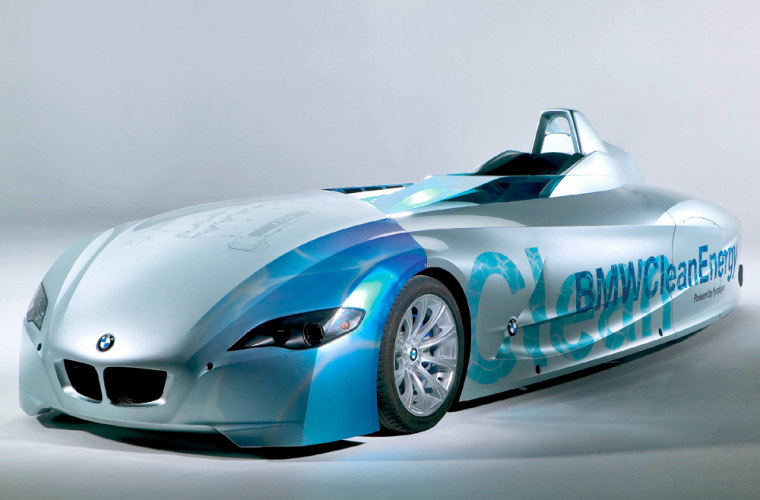German luxury carmaker BMW unveiled the world’s fastest hydrogen-powered car at the Paris auto show. Dubbed the H2R, it's capable of exceeding 185 miles per hour.
“Our drive towards the future is called hydrogen,” but in a way that gives a green twist to existing engine technology, BMW management board member Burkhard Goeschel said before the tarp slowly slipped off the sleek, zero-pollution car.
Goeschel, responsible for technology and development at BMW, said the streamlined rocket car sprints from 0 to 60 mph in about six seconds and reached a top speed of 188 mph on BMW’s test track at Miramas, France.
“It’s called the H2R -- ’R’ as in record,” Goeschel said.
6-liter, 12-cylinder engine
Unlike most hydrogen-powered vehicles, the H2R doesn’t operate on fuel cells but rather uses a modified 6-liter, 12-cylinder combustion engine for its propulsion. Like fuel cells, the H2R's engine essentially emits nothing but water.
An advantage of the higher combustion pressure of the hydrogen-air mixture is its higher degree of efficiency, BMW added.
The company cautioned, however, that while hydrogen itself doesn't pollute, most hydrogen is still obtained either from fossil fuels such as natural gas or by applying grid electricity to split water. Either way releases hydrocarbons.
Solar or wind power can be used to split water, but that process is even more expensive than via fossil fuel.
While BMW is developing fuel-cell driven cars as well, it says it is concentrating on the combustion engine because the sum total of its features and characteristics offers the largest number of advantages and benefits all in one.
GM, Mercedes execs weigh in
Most other carmakers are focused on fuel cells, but remain open to other approaches.
“Our bet is that the way to take the automobile out of the environmental equation is the hydrogen economy and hydrogen-based fuel cells,” said Fritz Henderson, the head of General Motors’ European arm. “We are spending a lot of time, money and effort to get there, but you can’t focus on only one (technology). You have to keep your feet in various different camps.”
Juergen Hubbert, head of DaimlerChrysler’s Mercedes division, had a stock answer when asked when fuel-cell cars would become a reality.
“This question comes up every year and ... I always have to say it will take 10 years,” he said, noting Daimler was making good progress with fuel cells but still faced bumps in the road.
“We have reduced volume (of fuel cells). We have reduced weight. What we couldn’t reduce so far is costs. Costs are still by far too high,” he said.
He cited a chicken-and-egg situation in which volumes had to go up to bring prices down, while high prices were keeping a lid on the size of the potential market. Fuel cells add thousands of dollars to the price of a standard car.
Nevertheless, fuel-cell cars are on the way, he said. “I think we will have a significant market share, like you see actually with the hybrids, between 2010 and 2012,” he added.
